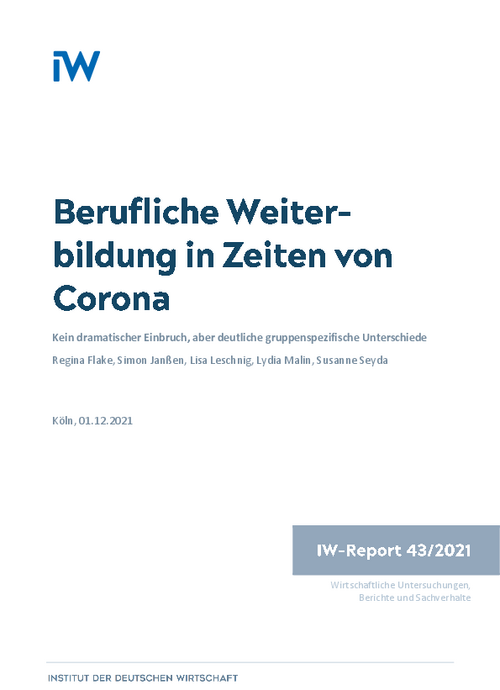Despite the corona-related contact restrictions, participation in continuing vocational education and training (CET) had not declined massively by summer 2020. This is because a large part of the measures could still take place thanks to corresponding digital offers. However, there are significant differences depending on the employment sector, qualification level, gender and number of children of the participants in CET.

Professional Training in times of Corona: No dramatic slump, but clear group-specific differences

Despite the corona-related contact restrictions, participation in continuing vocational education and training (CET) had not declined massively by summer 2020. This is because a large part of the measures could still take place thanks to corresponding digital offers. However, there are significant differences depending on the employment sector, qualification level, gender and number of children of the participants in CET.
The Corona crisis has posed major challenges to social and economic life. Earlier economic crises such as the financial and economic crisis of 2008 and 2009 have not only had a negative impact on income and employment, but also on participation in CVET. Lutz Bellmann and Ute Leber, among others, pointed out this connection in an article published in the IAB Forum in 2010.
Since the economic Corona crisis was triggered by a health crisis, however, the current situation differs in many respects from the economic crises of earlier decades. In particular, contact restrictions, the temporary ban on face-to-face events and the burden of childcare and home-schooling on parents may have led to a much greater impact on CET participation than in previous economic crises.
However, thanks to technological change, a far greater proportion of CET can now be delivered online. The Corona crisis has therefore also led to a digitalisation push in continuing education. A study by the Institute of the German Economic Institute (IW) based on a company survey in May 2020 shows that more than a third of the companies surveyed have made greater use of digital learning opportunities since the start of the COVID-19-pandemic than before the crisis. However, the study did not investigate the question of whether employees from different sectors and with different educational qualifications have benefited equally from the digitalisation push in continuing education.
It was also unclear whether the Corona crisis had a different impact on the participation of men and women in CET. According to some experts, the closure of day-care centres and schools due to the pandemic led to women in particular having to shoulder the multiple burdens of employment, childcare and home-schooling. An example of this is a study by Gundula Zoch and co-authors published in October 2020.
The first empirical results of the IAB survey "Living and Working in Times of Corona" shed light on this. Together with the IW, the IAB developed a question module to determine how participation in continuing vocational training developed during the Corona crisis. The description of the data and a precise breakdown of the weighted case numbers can be found in the data set section.

Professional Training in times of Corona: No dramatic slump, but clear group-specific differences

More on the topic

Further training needs of the automotive industry in transformation
Due to the ecological and digital transformation, significant parts of the German economy, particularly the industrial sector, are currently undergoing a transformation. This development also extends to the automotive sector, which occupies a vital position in ...
IW
The Increasing Importance of Literacy Courses and Further Training for the Low-skilled
Digitalisation and the demographic transition are presenting companies with ever new challenges. This puts pressure on firms to be in a process of constant change, a phenomenon reflected in the growing demands they put on their low-skilled employees.
IW